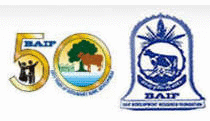The Salient Features of BAIF's Cattle Development Programme are :
· Use of state-of-the-art technology with high quality frozen semen of proven bulls, to breed non-descript, low productive cows, which are under neglect.
· Artificial Insemination (AI) services at the doorsteps of farmers. Instead of farmers bringing their animals to the AI Centre, the technician visits the farm. This results in better understanding of the farm situations.
· Close follow-up and monitoring, which results in better performance and helps in building confidence of the farmers.
· Conservation of native breeds and coverage of buffalo and goat breeding services as well.
· Integration of breeding services with extension, training, fodder resource development, health control and blend of research suitable to local conditions.
· Provision of support services like disease investigation, vaccination and nutritional advice.
· Training of local youth to take over the operational responsibilities after the withdrawal of BAIF.
· Targeting of the underprivileged and sensitivity to social and gender issues.
· Development of local organisations to manage the programme without external dependence.
Livestock is the mobile natural resource owned by small farmers. To convert the non descript and low productive cow/buffalo into an asset for milk production, RRIDMA has initiated cattle development through crossbreeding, using Jersey, Holstein Friesian, Gir breeds in Cows and Murrah in Buffalo.
RRIDMA provides Artificial Insemination services at the doorsteps of the farmers. There are 410 Cattle Breeding Centres spread over 20 districts of the state. Every artificial insemination is followed by pregnancy diagnosis of cows and further dialogue with the programme participants on various techniques and opportunities for improving the productivity particularly through preventive health care, supplementary forage production and enrichment of local feed resources.
IMPACT
The crossbreds come into milk production at an average age of 28-32 months and yield about 2100-2700 kg milk/lactation. Dairy development is providing a good opportunity for women and small farmers to earn a sustainable income, while promoting eco‑friendly practices such as organic farming, biogas production and stall feeding.
Door to door services has ensured closer interaction with the farmers and involvement of the entire family. The crossbreds are acclimatized to the local surrounding.
The AI programme has created dual source of income to the beneficiaries i.e. through the sale of milk and cross-breeds. Since inception, Above 2 lacs families and 9 lacs animals benefited through this programme.
As on March 2019, 5746109 cows/buffaloes have been inseminated, 2250357 pregnancies confirmed.546846 crossbreed male and 518153 crossbreeds females born. 995580 families benefited thorough this programme.
District wise cattle development centres - (As on March 2019)
| S.No. |
District |
MADA |
TADA |
NGO |
CSR |
SELF SUSTAINED MODEL |
TOTAL |
| 1 |
AJMER |
|
|
|
1 |
44 |
45 |
| 2 |
ALWAR |
08 |
|
|
1 |
19 |
28 |
| 3 |
BANSWARA |
|
12 |
|
|
14 |
26 |
| 4 |
BARAN |
|
|
|
|
04 |
04 |
| 5 |
BHARATPUR |
|
|
|
|
11 |
11 |
| 6 |
BHILWARA |
|
|
|
02 |
47 |
49 |
| 7 |
BUNDI |
|
|
|
|
10 |
10 |
| 8 |
CHITTORGARH |
|
|
1 |
04 |
32 |
37 |
| 9 |
DAUSA |
|
|
|
|
27 |
27 |
| 10 |
DUNGARPUR |
|
03 |
|
|
03 |
06 |
| 11 |
JAIPUR |
|
|
|
04 |
24 |
28 |
| 12 |
JHALAWAR |
|
|
|
|
13 |
13 |
| 13 |
KARAULI |
|
|
|
|
32 |
32 |
| 14 |
SAWAI MADHOPUR |
|
|
01 |
|
05 |
06 |
| 15 |
SIROHI |
|
|
|
|
14 |
14 |
| 16 |
TONK |
|
|
|
|
21 |
21 |
| 17 |
RAJSAMAND |
|
|
|
02 |
11 |
13 |
| 18 |
UDAIPUR |
|
|
02 |
03 |
26 |
31 |
| 19 |
PRATAPGARH |
|
|
|
|
03 |
03 |
| 20 |
NAGAUR |
|
|
|
|
06 |
06 |
| |
TOTAL |
08 |
15 |
04 |
17 |
365 |
410 |





